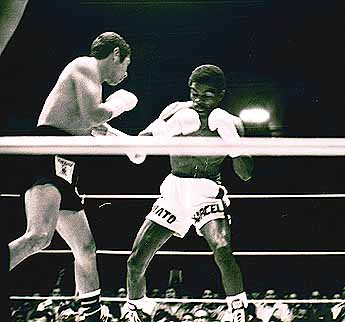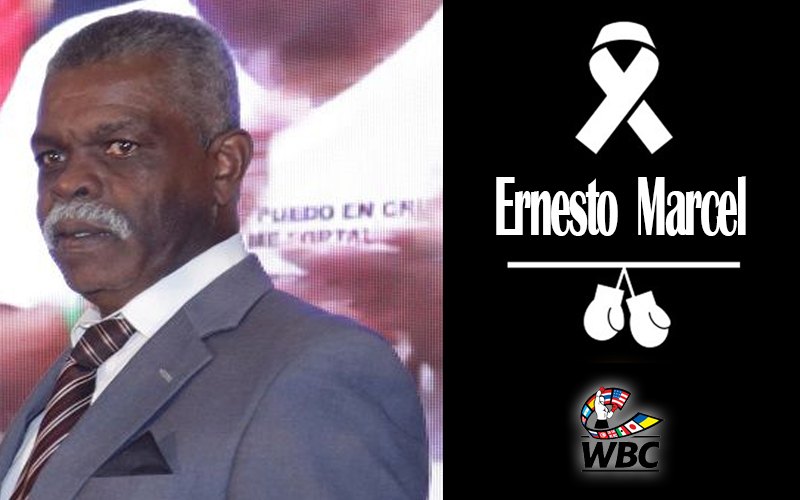We think of Panama’s great boxers and the name of Roberto Duran immediately comes to mind, and perhaps that of Eusebio Pedroza, the long-reigning featherweight champion. And then there is Ernesto Marcel, who died on June 29, aged 72, after struggling with health issues.
Marcel was WBA featherweight champion from 1972 to 1974. He retired while still champion, after scoring probably his greatest victory, a unanimous 15-round decision over Alexis Arguello, who of course was destined to win world titles at three weights.
“Marcel’s name has been on the Hall of Fame ballot but he never got inducted,” boxing historian and agent Don Majeski told Boxing Social over the phone from New York. “I consider him a great fighter. I’d rate him higher than Eusebio Pedroza. I’d go so far as to say Marcel is one of the most underrated boxers of all time.”
Majeski was ringside in Panama for a championship double-header in September 1973 when Roberto Duran stopped Japan’s Guts Ishimatsu in the 10th round of a lightweight title bout while Marcel retained his featherweight title by halting a short, stocky Japanese boxer named Spider Nemoto in the ninth round.
“Marcel could do it all,” Majeski recalled. “He was a complete fighter. He was aggressive but also he could box and he could punch. The complete package. And he had this million-dollar smile. I always remember that about him.
“It was enigmatic why he retired. There were big fights out there for him; fights with Ruben Olivares and Danny Little Red Lopez. I always thought it strange why he retired when he did.”

Slightly cloudy black-and-white video of Marcel’s bout with a then-21-year-old Arguello in Panama City in February 1974 provides an idea of Marcel’s prowess as a boxer as well as giving a hint of the great fighter that Arguello was to become.
Arguello looked the bigger man and he did his best to keep the pressure on Marcel. Yet while there was a machine-like method in Arguello’s boxing, Marcel was fluent in his style, at times flashy and loose-limbed, and he had the greater versatility.
Watching the video you become aware that Marcel had that ability that the great ones possess — namely the ability to come back from adversity.
Arguello had big rounds in the ninth and 10th. He found the target for his one-twos — the jab followed by the thudding right hand. He unloaded hooks, right hands, uppercuts. At times, Marcel seemed to be tottering back on unsteady legs. A right hand sent Marcel reeling back to the ropes in the 10th but the bell came to his rescue.
Yet Marcel came through this shaky spell to regain control of the contest. He moved, he clinched, in effect slowing down the fight, and in the 12th round Marcel came on strongly again, whipping in the right uppercut and landing right hands that had Arguello’s long hair flying around.
The last round was all Marcel. Fans could never have guessed that they were watching the last round of his career. Marcel had come through the fires of a gruelling, intensely demanding title defence. Perhaps he retired, at only 25, because he took so much out of himself in defeating future great Arguello.
Marcel turned professional in 1966, weighing 115 pounds. He was soon to have a rivalry with the undefeated Roberto Duran. Author Christian Giudice reveals in the Duran biography Hands of Stone that Duran and Marcel trained in the same gym but at different times. Each vowed to knock out the other should they ever meet in the ring.
The all-Panama showdown happened in May 1970, in the junior lightweight division. According to the Duran biography, the bout was stopped with 10 seconds remaining in the 10th and final round, with Duran in front on the scorecards. Marcel later argued that the fight should not have been stopped. Somewhat indistinct video suggests that Duran was just too strong and too relentless for him. Referee Isaac Herrera waved the finish with Marcel holding on although not apparently in serious trouble. Marcel did not appear to make any protest. Referee Herrera was quoted as saying he stopped the fight because Marcel had barely thrown a punch in the last round.
Marcel came back to win seven bouts in a row, defeating old rival Miguel Riasco in a rubber match and twice outpointing Venezuela’s future WBA 130-pound champ Alfredo Marcano (the second time on Marcano’s home ground in Caracas).
Matched with Kuniaki Shibata for the WBC featherweight title in Japan in November 1971, Marcel fought the champion to a 15-round draw. One of the two Japanese judges had Marcel winning by six points, the other Japanese judge had the fight even while the South Korean judge saw Shibata ahead by three points. Shibata was making his second defence of the title after shocking Vicente Saldivar in a 12-round TKO win in Mexico.
According to a contemporary report, Marcel cut Shibata over the right eye with a left hook in the third round. Marcel was probably a bit unlucky not to get the decision but it was a torrid battle. “The last two rounds were fought toe-to-toe, with both men fighting desperately,” Boxing Illustrated reported. A point deducted for coming in with his head cost Marcel the decision.
Marcel was not to be denied when making his second world title attempt, defeating Antonio Gomez on a majority 15-round decision on the champion’s home ground in Venezuela in August 1972 to become WBA champion.
The black-and-white video shows Marcel dominating most of the rounds, backing up the tough Gomez with surging, two-handed attacks. Gomez had his best round in the 10th when he clearly hurt Marcel with a right uppercut and, as in the Shibata fight, Marcel had a point deducted for boring in with his head. The scoring referee and both judges were Venezuelan, and one of the judges somehow made the fight a draw when it was an obvious, clear win for Marcel.
Marcel made four successful defences of the title, including a 12th-round TKO over Gomez in a rematch in Panama, and he won a split 10-round decision over future junior lightweight champion Sammy Serrano, of Puerto Rico, in a non-title bout. He retired with a record of 40-4-2 (23 KOs).
Marcel’s passing has focused attention on his considerable merits as a fighter. He never made it into the Hall of Fame while he was alive — but he surely will get there eventually. He deserves it.

International Boxing Hall of Fame in due course. Image: WBC